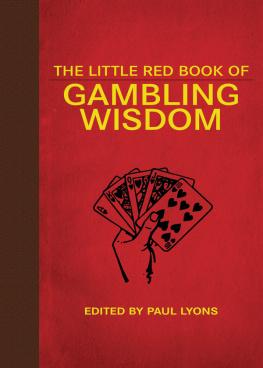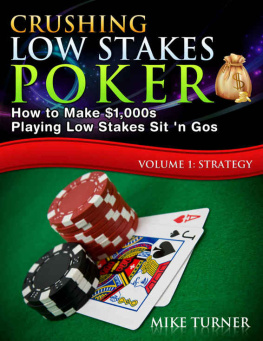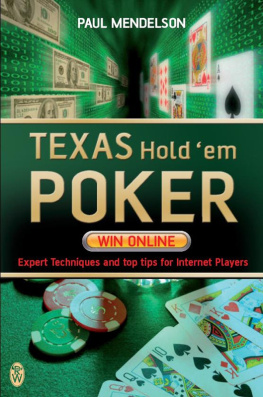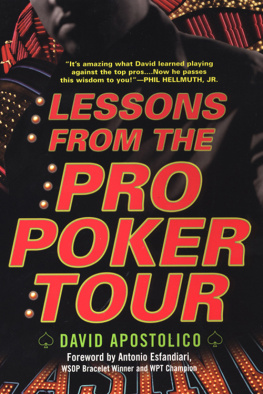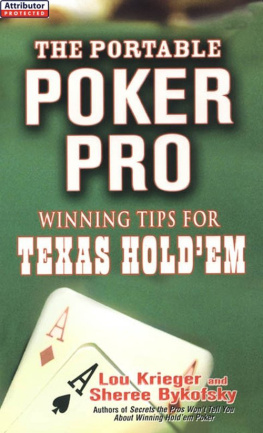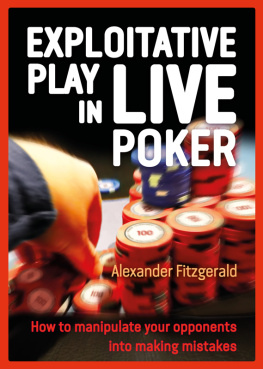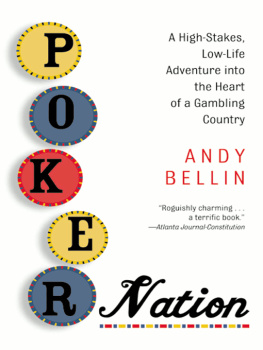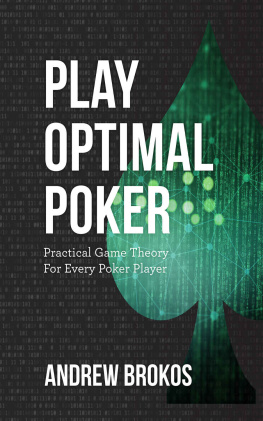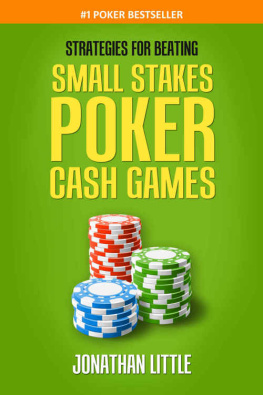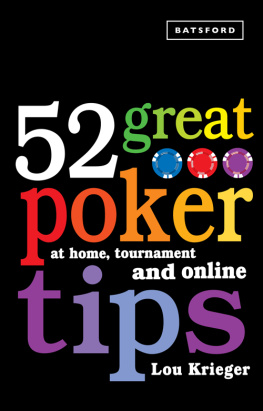THE LITTLE RED BOOK OF
GAMBLING WISDOM
EDITED BY PAUL LYONS

Skyhorse Publishing
For George and Amy with Aloha
Preface and order copyright 2011 by Paul Lyons
All Rights Reserved. No part of this book may be reproduced in any manner without the express written consent of the publisher, except in the case of brief excerpts in critical reviews or articles. All inquiries should be addressed to Skyhorse Publishing, 307 West 36th Street, 11th Floor, New York, NY 10018.
Skyhorse Publishing books may be purchased in bulk at special discounts for sales promotion, corporate gifts, fund-raising, or educational purposes. Special editions can also be created to specifications. For details, contact the Special Sales Department, Skyhorse Publishing, 307 West 36th Street, 11th Floor, New York, NY 10018 or
Skyhorse and Skyhorse Publishing are registered trademarks of Skyhorse Publishing, Inc., a Delaware corporation.
Visit our website at www.skyhorsepublishing.com.
10 9 8 7 6 5 4 3 2 1
Library of Congress Cataloging-in-Publication Data is available on file.
ISBN: 978-1-61608-392-2
Printed in China
Contents
Two Cents Worth: From Mavens, Maestros,
Metaphysicians, Moralists, and Others

Preface
I n the literature on gambling there is a tradition of the author admitting at the outset that one motivation in writing the book is to sell enough copies to recover gambling losses. For instance, Jean de Prechac wrote in 1682, The author, having lost at basset, managed to recoup by writing a book on the game that earned back for him most of what he had lost. S. W. Erdnase likewise wrote that his The Expert at the Card Table (1902) would not make a fool wise, or curtail the annual crop of suckers; but whatever the result may be, if it sells it will accomplish the primary motive of the author, as he needs the money.
However far this little volume of gambling quotations goes toward repaying the losses Ive sustained while gambling, Ive much enjoyed the process of collecting them. Making my way through the various halls in which gambling expressions are to be found has been a way of intermixing labor and play. And that factthat the pleasure of the doing can be itself a form of profit over and against calculations of gain or wasteis where I hope this book points: Whatever activities humanoids have been passionate about, the joy and play elements in the doing offer a measure of redemption. (Let me say at once, and have done with it, that where it is without joy gambling is a sickness.)
What a collection of quotations potentially offers is some distillation of the literature, a concert of voices that goes beyond what any single author could say on the subject. And gambling is an astonishingly vast and varied subject. The itch for play, in Charles Cottons memorable phrase (1674), the impulse to make it interesting or sweeten the pot, seemingly pervades all times and places and all classes, from Gods who literally bet the Sky to mere mortals with nothing to gamble but themselves or parts of themselves. In short, gambling perhaps reveals the all-too-human capacity for a range of marvelously mixed behaviors, from the sublime to the stupid, as vividly as any activity.
If this book makes you more aware of the spirit of gamble, of why people have gambled and with what result, or why and how you yourself have gambled, it should add to the enjoyment you take in gambling, and even make you a better gambler. For my own part, in my various researches I have been cheered at the contemporaneity of expressions from the ancient gamblers, their ability to catch the smarts and sweats of skidding or the giddy highs of being on a roll. And I have been surprised, moved, delighted, and informed by the wit and (sometimes dubious) wisdom of contemporary gamblers. For mea lifelong lover of books and sometime haunter of the Temples of Chancethe next best thing to gambling has been reading about others doing it.
Gambling, at its healthiest, is one way of activating the soul, nudging it from its hungry sleep. Im speaking about gambling in its most reductive form: taking a chance. The act of taking a chance is energizing. The art of taking a chance can lead to the sublime.
STEPHEN DUNN
Gambling: Remembrances and Assertions (1993)
They gambled in the Garden of Eden, and they will again if theres another one.
RICHARD ALBERT CANFIELD (18551914)
quoted in Cy Rice, Nick the Greek: King of Gamblers (1969)
1

For Openers
In the beginning, everything was even money.
MIKE CARO, Mike Caro on Gambling (1984)
Looking for where the action is, one arrives at a romantic division of the world. On one side are the safe and silent places, the home, the well-regulated roles in business, industry and the professions; on the other are all those activities that generate expression, requiring the individual to lay himself on the line and place himself in jeopardy during a passing moment.
IRVING GOFFMAN, Where the Action Is (1967)
Odds are that if youre holding this book you already have some interest in gambling and gamblers, have some sense of the pervasiveness of gambling in human history. You have known for yourself the thin-ice thrills and dangers of action or gamble, its defiance of restrictions, its shimmering chances for ephemeral ennoblement (as the sociologist Goffman calls it), and the seductive threat gamblers face of receiving a status bloodbath (Goffman) along with losing their bankrolls.
To gamble is to put something (a stake) at risk voluntarily, to court and cultivate deep playplay that has consequences, personal and material, within and against the narratives of a particular time, place, and culture. Everyone craves gamble in some form, for an infinite variety of reasons, many of them twisted, though all are connected to the desire for action that makes one feel more alive, that gets the juices going. Even if, especially if, it means playing with fire, the possibility of going in over ones head, head over heels.
Theres nothing wrong with sobriety in moderation, wrote the poet John Ciardi, a gamblers thought to be sure, suggesting as it does that humans need to take proper precautions against the dullnesses in and around themselves, that they need to get drunk on something, anything on wine or love or art or sport; in short, that the adult mind benefits from recess as much as the childs, that health requires play.
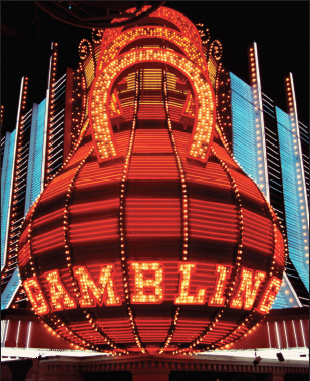
Play has been universally recognized by philosophers as a vital and inescapable element of every human activity, profession, and enterprise. In Homo Ludens (1949), anthropologist Johan Huizinga argues that You can deny, if you like, nearly all abstractions: justice, beauty, truth, goodness, mind, God. You can deny seriousness, but not play. For Huizinga, pure play is endlessly imaginative and free, and its spirit is impoverished when it becomes material, regulated, and competitive.
Among gamblers disposed to discuss such matters, most would agree that gamble includes Huizingas sense of creative and joyful play, but would cringe at the idea of anything so wholesome, anything that so precludes the grime of the ruin factor, slings and arrows, and the dicey dream of bucking the odds.
Next page
